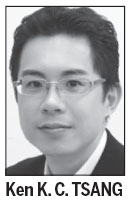Ponder housing problems, but stick to our advantages
Updated: 2013-01-10 06:14
By Ken K. C. Tsang(HK Edition)
|
|||||||
Soaring housing prices in Hong Kong and rising income lead many of our young people to envy the Singaporean Housing and Development Board (HDB) system, under which the government supplies affordable housing units to the market and, unlike Hong Kong, citizens may rather freely (in light of some minor restrictions) choose their own flats in terms of size and location. They may make use of their Central Provident Fund account to pay for the flats; and if that's not enough, the government may provide subsidies. The whole purpose behind their housing policy is to turn as many of the citizens into property owners as possible in spite of a scarcity of land resources in Singapore.
Such an aggressive housing policy may sound foreign to many Hong Kong people, but it may be music to their ears, too. Eva Cheng Yu-wah, former Secretary for Transport and Housing and the chairperson of the Hong Kong Housing Authority, once openly commented that "the ownership of a house does not necessarily mean happiness." The mindset of the Hong Kong government is rather simple: As long as you have shelter, then you are doing okay. The public housing policy does not take people's sense of ownership, dignity, social integration and commitment to the city into account.

The result, sadly, is that our society is increasingly polarized. According to government's statistics, compared with 2001, there are more young people (25-34 years old) living with their parents in 2011, with males going up 13 percent and females a stunning 31 percent. The numbers clearly indicate that our young people's ability to move out has diminished significantly over the years. Domestic conflicts caused by cramped living spaces may be prolonged due to high housing prices and a long public housing waiting lists approaching 200,000 applicants.
Former Chief Executive Donald Tsang could hardly comprehend the difference between owning a house and renting a house. Such a sentiment prevailed in the government until CY Leung came to power. But when he eagerly sought vacant land to build more public houses - I believe that he acted in good faith - he encountered stringent objections in the communities, among them were District Council members and private home owners.
The origin of the problem is the stigma on rental public housing, which is what Singapore had made a great effort to avoid. In Singapore, many HDB flats are built quite near to private houses for the sake of class integration. The philosophy there is that ownership makes them behave responsibly toward their own properties and communities. The whole Singaporean housing policy is meant to be a social glue that integrates the low income and the rich; whereas in Hong Kong segregation is the phenomenon. What we lack is an ideology that places social cohesion on the top of the public housing policy agenda.
Social changes seem to occur much faster than the Hong Kong government can comfortably cope with. Indeed, only in this generation women become very reluctant to marry men who do not possess property, whereas such a phenomenon was unknown to our parents, as many of them grew up in public estates.
The kernel of the housing problem today is more psychological than social and economic, but a housing policy that merely aims at satisfying the basic human needs is hopelessly inadequate when most people keep on asking for more. Consequently, the housing problem that pushes down marriage and birth rates, and the problem of sustainability caused by an aging population, will fuse.
That said, then should we go the Singaporean way? I'd say no. In Hong Kong, we still put our faith in market mechanisms. What we need is a thorough overhaul of the land and housing policy. Today, half of the population lives in public housing, that is to say, the private housing market takes care half of the population. We shouldn't let the huge demand for public housing blind us from the nature of the problem: Housing prices skyrocketed owing to tighter land supply over the last decade.
Nevertheless, more new land will be granted in the future; and what is more, the "Hong Kong property for Hong Kong residents" condition will be a safeguard against excessive scalping. The high-premium-low-rent structure should be reviewed in order to encourage competition, hence lower sale price of newly built buildings. Hong Kong people need not envy the Singaporeans once the "invisible hand" works again. By then, the world-class quality of Hong Kong properties should be the envy of the world.
The author is vice-chairman of D-Dong and a current affairs commentator.
(HK Edition 01/10/2013 page3)